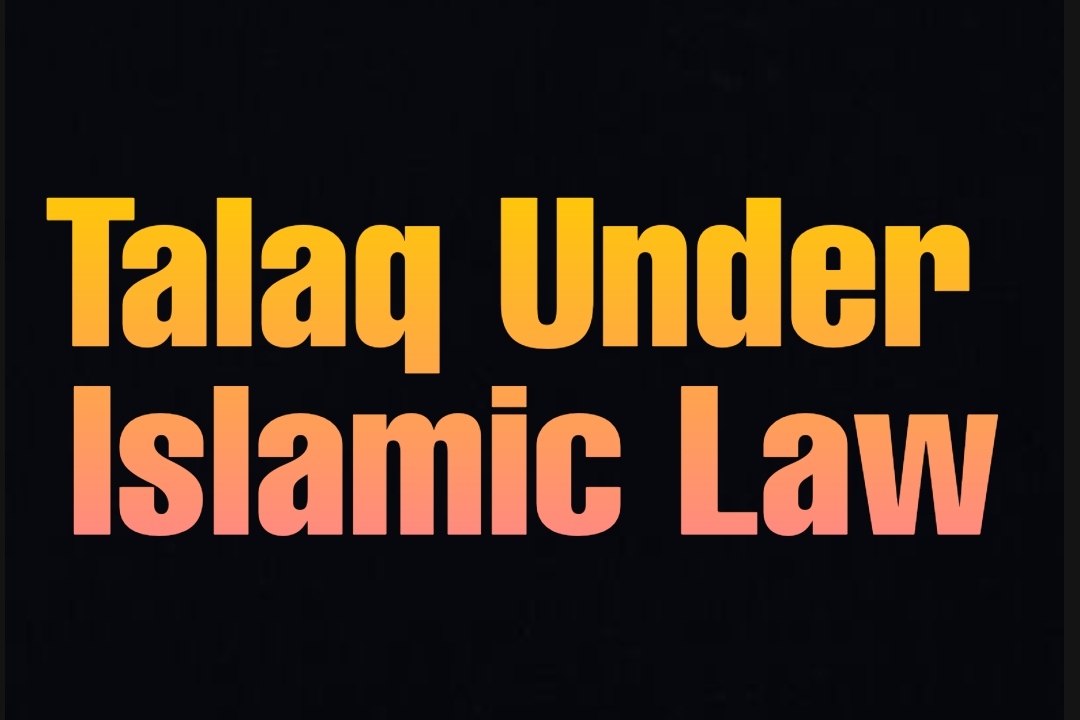Summary
The topic of divorce under Islamic law is the center of this essay. It discusses the different types of divorce available under Islamic law and how to terminate a marriage. The Supreme Court, a landmark decision in Shah Bano v. Union of India, is also examined.
Introduction
A pleasant family life necessitates a strong marriage between the husband and wife. As a result, Islam emphasizes the importance of maintaining a marriage and forbids breaking the marriage bond. No marriage intended to be dissolved at the outset, but miserable circumstances force the breakage of the marital bond. Divorce is one method of doing this. Divorce in Muslim law can take place either through the parties’ actions or through a court decree. However, divorce never has been considered a rule of life, regardless of how to carry it out. Divorce is an exception to the status of marriage in Islam.
Divorce according to the Prophet, is the worst thing that has been permitted by law. Divorce is a bad thing, should be avoided as much as possible. However, when the parties to a marriage, unable to continue their relationship with mutual emotion and love, it is preferable to let them divorce than to force them to live together in an atmosphere of hostility and discontent. In Islamic law, divorce is based on the spouse’s incapacity to live together rather than any specific cause (or party’s fault) for the party’s inability to live together.
A divorce might occur as a result of either the husband’s or the wife’s actions. Under Muslim law, there are numerous types of divorce, which will be exploring, further below.
History
According to the Quran, marriage should be intended to last an indefinite amount of time, as evidenced by its description as a strong connection and the rules governing divorce. Marriage should be founded on love (mawadda wa rahma, 30:21), and decisions affecting both spouses should be made with mutual consent. When marital peace is impossible to achieve, the Quran enables and even encourages the spouses to divorce.
Before Islam, divorce in the Arab world was controlled by unwritten customary law that varied by region and tribe, and its compliance was contingent on the authority of the people concerned. Women were particularly susceptible in this arrangement. Men in pre-Islamic times kept their wives in a condition of “limbo” by repeatedly rejecting and reclaiming them. Furthermore, the pre-Islamic bridewealth (mahr), which was paid by the groom to the bride’s family, was transformed into a dower and which became the wife’s property, Although some scholars believe that the practice of giving at least a portion of the mahr to the bride began shortly before the advent of Islam.
Classical Islamic law was derived from Islamic scripture sources (the Quran and hadith) utilizing a variety of methodologies created by various legal schools. It was interpreted by jurists (muftis), who were required to provide a free legal opinion (fatwa) responding to any question. Family disputes in sharia courts, resolved by a judge (qadi), who had enough legal training to decide some legal matters and who consulted a mufti when presented with a complex legal issue. The judges were involved in informal arbitration, which was the favored means of resolving conflicts, and were active members of the local community.
Divorce vs Talak: Difference
These two names are interchangeable in everyday life, however, under Muslim law, a person seeking “divorce” is bound by the rules of the Dissolution of Muslim Marriage Act, 1939. In contrast, Muslim Personal Laws govern “Talaq” processes.
Dissolution of Muslim Marriage
By the death of a spouse
In law, the death of either the husband or the wife results in the dissolution of the marriage. When the wife dies, the husband is free to remarry right away, but the widow must wait a specified amount of time. This period is known as the iddat period.
By the act of the parties

By the Husband
Talaq
The word talaq is commonly translated as “repudiation”. In law, it refers to the husband’s unrestricted ability to divorce his wife at any moment. Without stating any reason, a Muslim husband of sound mind may divorce his wife whenever he wishes. The divorce is effective from the time the talaq is issued. Although a talaq does not need to be spoken in the presence of the wife, such pronouncements must be made known to her for them to be effective.
Strict adherence to specific forms is required by Shia Law. The Arabic word talaq must be said verbally in the presence and hearing of two male Muslim witnesses who have attended the age of Puberty. Unless your husband is physically incapable of pronouncing, then write it down.
Talaq can be either reversible or irreversible. The reversible talaq forms are regarded as acceptable, whereas the irrevocable talaq forms are considered disapproved. The following are the several types of talaq:
- Talaq- ul- Sunnat According to the Prophet traditions, this type of talaq is effective. It is split into two sections:
- Ahsan– As its name suggests, it is the best type of talaq. The procedure for the husband is: The husband has to publish a declaration of divorce in a single sentence that it has to be made in a state of purity (when a woman is liberated from her menstrual cycle). If a husband is engaged in any kind of sexual activity within the iddat period (the period of chastity, which a Muslim woman is obliged to observe after the breakdown of her marriage, whether by death or divorce), it will be implicit revocation of talaq. It is important to remember that after the iddat period, the divorce is definitive. Even if the woman is in her menstruation, talaq-e-Ashan may be delivered as long as the parties have not consummated their relationship.
- Hasan– Hasan means “excellent” in Arabic, therefore divorce spoken in Hasan mode is good but not as valuable as divorces pronounced in Ahsan mode. The husband has to make three divorce statements right now. These three proclamations ought to be made in three consecutive tuhrs in the case of a menstrual woman (state of purity).
The Proclamation should be made at three 30-day intervals in the case of a non-menstruating wife. During these three declarations, no sexual intercourse is allowed, and if this happens, the divorce procedure will be declared annulled.
On the third proclamation, regardless of iddat peri, Talaq Hasan becomes irreversible.
- Talaq-ul-Biddat(Talaq-ul-Biddat) is a type of Talaq
The “Umayyads” invented this kind of talaq to get around the strictures of the law. According to the Hanafis, this is a form of talaq that is sinful. This method of talaq is recognized in Sunni law, but it is regarded as immoral. Shias and Malikis do not recognize this mode of talaq.“Talaq, talaq, talaq” or “I divorce thee, I divorce thee, I divorce thee” are examples of three declarations delivered in a single tuhr, either in a single sentence or in distinct sentences.
A single statement expresses the decision to dissolve a wedding and makes it irreversible. It is often said, like this: “I divorced irrevocably. “Separated Partners, by triple talaq are unable to remarry unless the woman first marries another man and then divorces him, a process known as Nikah Halala.
The Supreme Court of India ruled in Shayara Bano v Union of India and others, that triple talaq is unconstitutional because it is contrary to section 14 of the Indian Constitution.
Ila (Vow of Continence)
Ila refers to the situation in which a husband of sound mind who has reached the age of majority swears in the name of God that he would not have sexual relations with his wife and leaves her to observe iddat. If the husband resumes sexual intercourse within the iddat period observed by the wife, the Ila shall be canceled. Ila is not practiced, in India which is important to mention.
Zihar (injurious Assimilation)
A husband must be sane and over the age of 18 to be eligible for this type of marriage breakdown. She has the right to refuse to have sexual relations with him if he compares his wife to his mother or any other woman in some parameters. If he has not carried out lawful penance, such rejection will not be recognized. Zihar can be used to dissolve muta marriages (common among Shia) in which no other kind of divorce is permitted.
By Wife
Talaq by wife– Divorce has been given by the wife with the husband’s approval.
Talaq-e-tafweez
The only option for a woman is to divorce her husband; nevertheless, the power to divorce must be transferred solely by the husband. It is a type of agreement before or after marriage that gives the spouse the right to divorce her husband provided certain conditions are met, including:
Any other condition that must not be contrary to public policy is that the spouse is unable to support her for a set amount of time.
If the husband complies with the terms of the agreement, the woman may divorce her marriage without violating the law.
The fact that the husband delegated powers to the wife does not exempt her from the right to issue talaq.
By Mutual Consent

Although divorce by mutual consent, was not recognized by Muslim law, it became available to Muslim women after the passage of the Dissolution of Muslim Marriages Act in 1939.
Khula
Khula means “to lie down” before the law. The husband rests his right hand on top of his wife. It refers to an agreement reached to end a sexual relationship in exchange for compensation paid by the wife to her husband out of her property, including all that can be given as dower.
Khula is a consent-based divorce at the request of a wife, in which the wife agrees to give her husband some consideration. It is essentially a “redemptive” marriage contract.
Essentials
- There has to be a proposal from the wife’s end.
- The husband must accept the offer in exchange for consideration.
- It is vital to adhere to the iddat period.
- The husband cannot revoke the divorce once it has been recognized, under Shia law, but the wife has the power to regain the consideration within the iddat term.
Mubarat
Mubarat denotes the end of the marital ties by both partners. To dissolve a marriage, both partners must agree.
In this method of divorce, any of the parties can propose. When you accept an offer, it becomes irreversible. It is essential to have iddat.
If a couple is unable to sustain their relationship through mubarat, Shia law allows them to end their union.
The last method for dissolving a marriage stated in the table above is judicial separation.
Judicial Process

Lian (mutual imprecation)
Lian is defined, when husband’s erroneous accusation of infidelity against her. When a husband falsely accuses his wife of infidelity, she can sue him and get a divorce on the same grounds under the Act by bringing a conventional dissolution of marriage suit. In the case of Zafar Husain v Ummat ur Rahman, the Allahabad High Court ruled that a Muslim wife has the right to initiate a divorce suit against her husband and get a decree because she was wrongfully accused of adultery by him.
Essentials
- A husband must be responsible and rational.
- He accuses his wife of infidelity.
- This accusation must be false.
- False charges do not destroy the relationship ipso facto (by their existence); rather, they give a basis for the wife to file a petition before the court to terminate the marriage.
- The marriage will continue until the court issues a decree of dissolution of marriage.
- The judicial separation by the lian method is irreversible.
- This style is only relevant to Sahih weddings, not valid marriages.
- Before the end of the trial, the husband can retract, confessing that he made the claim of adultery against her wife and that it was false.
Faskh ( Judicial rescission)
According to the Quran, husband and wife must respect each other, treat each other with respect, and obey each other’s authorized directives.
If they discover that they can no longer live as husband and wife, they can contact a qazi, who, after a thorough assessment, may decide to end their marriage.
The Dissolution of Muslim Marriage Act of 1939, Section 2, lists nine grounds on which a Muslim wife can get a divorce decree:
- Absence of Husband– the husband has been unknown for the previous four years. The decree of dissolution of marriage on this ground will take effect six months after it is issued, and during that time if the husband appears in person or through an authorised representative. And, If the court is satisfied, the decree may be set aside.
- Failure to maintain- If a husband fails to maintain his wife for two years. Poverty, deteriorating health, or unemployment are not valid defences in front of the husband.
- Husband imprisonment- If the husband is imprisoned for seven years or longer.
- Failure to perform marital duties- If the husband is unable to perform his marital commitments for three years without justifiable reasons.
- Husband’s impotency—the husband was and continues to be impotent at the time of marriage. If the husband proves to the Court that he is no longer impotent within one year of the date of the order obtained by the wife for dissolution of marriage based on impotency on application. If the husband satisfies the court, the court will not issue a divorce on this basis.
- Insanity, leprosy, or venereal disease- If the husband has been insane for two years or has been suffering from leprosy or any venereal disease, the wife might seek judicial divorce on the same grounds.
- Wife’s repudiation of marriage- If a girl is married by her father or guardian before the age of 15, she has the right under Muslim law to repudiate the marriage once she reaches the age of 18. For the same, she has a right to a divorce decree.
- Muslim Law Recognized Grounds for Divorce- A wife is also entitled to a divorce, provided the grounds for divorce are recognized as valid by the law.
- Cruelty by the husband- If the husband treats his wife cruelly, she can file a petition in the court for a judicial separation on the same grounds.
The following are some grounds for cruelty that could be claimed.
- Assault on the body.
- Making slanderous remarks that harm her reputation.
- She is compelled to live a morally reprehensible existence.
- preventing her from following her religion
- If a husband has multiple wives, he does not treat them equally.
By Change in Religion
Apostasy by husband
The apostasy of a Muslim husband from Islam will result in the immediate dissolution of marriage. The apostasy of the husband falls outside the scope of section 4 of the 1939 Act of Dissolution of Marriage. Consequently, apostasy by a husband is still regulated by ancient law, which stipulates that the rejection of a husband from Islam will result in complete marriage and immediate disunity.
When a Muslim husband converts to a different faith (such as Christianity), his marriage is immediately dissolved, and his wife ceases to be his Muslim wife. As a result, the woman is not bound by Muslim law and is free to marry someone else (immediately) instead of waiting for the Iddat period.
Wife’s apostasy
The conversion of a married Muslim woman to a different religion from Islam does not automatically destroy her marriage.
In addition, the wife may seek a decision to dissolve her marriage on one of the grounds set out in section 2 of the Act, although she has renounced Islam.
Article 4 does not apply to a woman who converts to the Islam of another faith and then returns. So if a Hindu woman converts to Islam and marries as per Muslim law, Marriage will be dissolved ipso facto when it renounces Islam and returns to Hinduism. Marriage would not dissolve unless it re-embraced Hinduism and instead became a Christian.
Landmark Judgement
Md. Khan v. Shahmai, a Khana Damad
In Md. Khan v. Shahmai, a Khana Damad husband agreed to pay a certain amount of marriage expenses incurred by his father-in-law in the event of his leaving the house and gave his wife the power to divorce him under a prenuptial agreement. Without paying the debt, the husband runs away from his father-in-law’s home. The wife took use of her legal rights and divorced herself. It was determined that she exercised the power assigned to her and obtained a lawful divorce.
Even in post-marriage arrangements, power delegation is possible. Thus, where it is stipulated in an agreement that if the husband fails to pay her support or takes a second wife, she would have the right to divorce herself, such an agreement is lawful, and such conditions are reasonable and not contrary to public policy. It should be underlined that whether or not the power is to be employed in the case of a contingency is up to the wife; she may choose to exercise it or not. The occurrence of a contingency event does not automatically result in divorce.
Zafar Husain vs Ummat ur Rahman
The Allahabad High Court held that the Muslim woman is entitled to sue her husband for divorce and obtain a decree because he wrongly accused her of adultery.
Yousuf vs. Swaramma
The concept that the Muslim husband has an arbitrary unilateral right to inflict instant divorce does not correspond with Islamic injunctions, according to Justice Krishna Iyer in Yousuf v. Swaramma. A common misconception is that a Muslim male has unrestricted right to dissolve a marriage under Quranic law. The entire Quran prohibits a man from seeking pretexts to divorce his wife if she remains faithful and submissive to him.
Mohd. Ahmed Khan vs. Shah Bano
In the case of Mohd. Ahmed Khan vs. Shah Bano, Shah Bano’s husband, Muhammad Ahmed Shah, divorced her at the age of 62, She and her five children were disowned and cast out of the matrimonial home. She was divorced by her husband, by the instant triple talaq or Talaq-ul-Biddat, which was used by her husband as a defence and not to pay for maintenance because she was no longer his wife. She approached the Madhya Pradesh High Court to restore her maintenance amount of rupees 200, which had been halted by her husband, and to increase it to rupees 500. The court granted Shah Bano maintenance under Section 125 of the CrPC since she is unable to earn and maintain herself. Although it violated Islamic law, Section 125 of the Criminal Procedure Code overrode the personal law and allowed the judgment to stand.
Shah Bano v. Union of India and others
Shayara Bano, married to Rizwan Ahmed and a victim of domestic violence, received a divorce letter from Talaq-ul-Biddat claiming divorce immediately when she was visiting her parents. She filed a petition with the Supreme Court, requesting that triple talaq, nikah halala, and polygamy be declared unlawful. Even though the Court only looked at the triple talaq petition, it ruled it illegal and granted an injunction prohibiting husbands from announcing triple talaq on their wives until the government creates legislation regulating immediate triple talaq.
Talaq-ul-Biddat, or triple talaq, is illegal since it violates Article 14 of the Constitution.
Current Scenario
The Supreme Court declared Triple Talaq unlawful after the Shah Bano case. Furthermore, by passing the Muslim Marriage (Protection of Rights on Marriage) Act, 2019, the government has made a change.
Conclusion
Following the Supreme Court’s decision in 2017 declaring triple talaq unlawful under Muslim law, both husband and wife have equal rights to end their marriage. When two people enter into a marriage relationship, they may not know each other, as well as they did after living together for a while. Following that, if there is no compatibility between them, living apart is the best option.
Bad relationships can ruin both people’s lives, and unlike Hindu law, Muslim law recognises talaq as an old ritual that is not considered a sin.
FAQs
Is a minor girl allowed to repudiate the wedding?
Yes, a minor girl may repudiate their marriage when they reach the age of majority.
What does Allah say about divorce?
“The Quranic verses say that a couple enjoys the freedom to remarry and reunite even after two divorces, but after the third, they can reunite only if the woman gets married to another man and divorced.
Can a woman divorce her husband in Islam?
Both Muslim men and women are allowed to divorce in the Islamic tradition. But community interpretations of Islamic laws mean that men can divorce their wives unilaterally, while women must secure their husband’s consent.
Will the first marriage be valid if the husband abandons Islam and adopts a different religion?
Where a Muslim husband converts to another religion (say Christianity), his marriage is immediately dissolved and the wife ceases to be a Muslim wife of that husband. As such, the wife is not governed by Muslim law and is free to marry another person (immediately) without waiting for the Iddat period.
Can women who observe iddat marry any man?
Women during this period have to remain in seclusion and are abstain from marrying another person.
Relevant Links
https://www.legalserviceindia.com/legal/article-5479-divorce-under-muslim-law-the-concept.HTML
http://www.helplinelaw.com/family-law/DIVM/divorce-under-muslim-law.HTML
